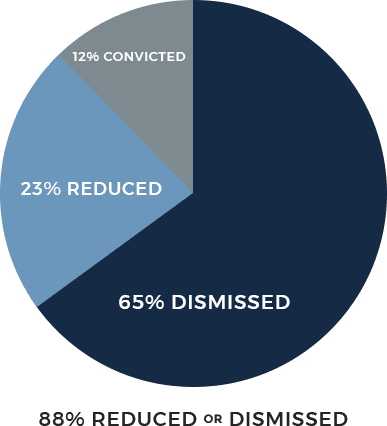
DWI Lawyer in Rochester, NY
Our DWI Defense Attorneys Represent Individuals Charged With Drunk Driving
Are you facing DWI charges in Rochester, NY? The prosecutors in Rochester and throughout New York take a tough stance against drunk driving, both for the purpose of punishing individual offenders and to send a message about their work to enforce public safety. It’s not easy to beat DWI charges in New York. But Robert King has a track record of success, with the majority of DWI cases he has handled ending in a reduction or dismissal of the charges. Rochester DWI Attorney King has been selected for inclusion in the 2016, 2017, and 2018 Super Lawyers Rising Stars lists, joining less than 2.5% of attorneys who make this prestigious list.
Alcohol-related accidents are on the rise, so it should come as no surprise that New York law enforcement officials have begun to crackdown on the amount of drunk or drugged drivers on the road. In the haste to arrest dangerous drivers, Rochester police and patrol officers have been known to wrongfully accuse or over-charge individuals with intoxicated driving offenses. A conviction of driving while intoxicated (DWI) is very serious, and you may lose your license, face jail time and be subjected to fines.
New York Dwi Penalties

If you are tried and convicted for driving under the influence, you may be facing multiple penalties. While the circumstances of each case will vary, it is always recommended that you work with a lawyer after an arrest. If you are facing any of the following penalties, do not hesitate to get in contact with our Rochester DWI lawyer!
FIRST-OFFENSE DWI IN NEW YORK
First-time offenders can experience the following penalties:
Convicted individuals are required to attend alcohol evaluation courses and may spend up to one year in jail.
SECOND-OFFENSE DWI IN NEW YORK
Not your first offense? Second-time offenders will see an increase in their penalties, including:
An interlock ignition device may also be required to be installed in your vehicle.
THIRD-OFFENSE DWI IN NEW YORK
Individuals with third-time convictions can face up to 7 years in jail, a license suspension minimum of 1 year, and could be required to pay up to $10,000 in fines. An interlock ignition device may be required as well as alcohol assessment and up to 60 days of mandatory community service.
DWI ACCIDENTS IN NEW YORK
If your arrest was the result of an accident, you could be charged with additional crimes on top of your DWI offense. In the event that an accident resulted in a death, for example, you may be charged with vehicular manslaughter.
Should You Take A Dwi Breath Test?
A breath test provides evidence in the criminal case. Most people who are arrested for DWI are actually over the legal limit, so the evidence would harm them in the criminal case. So why should you consider taking the test? Because most people in New York rely on driving a car on a regular basis.
If you are arrested for DWI, and the proper protocol is followed, your license will most likely be suspended at arraignment. If you have taken a breath test, your attorney can apply for a hardship license, and you will likely be eligible for a conditional license 30 days following arraignment. A conditional license allows you to drive to and from work, school, probation, the DMV, medical treatment, your child’s school, your child’s daycare provider, and 3 hours of free time per week.
If you refuse the test, you will not be eligible for a hardship license. You will be granted a hearing by the Department of Motor Vehicles where it will be determined whether you refused and proper protocol was used. If so, your license is suspended for one year, and you will be doing no driving whatsoever.
There are certain times when you should not take a breath test:
If you have received two or more Driving While Intoxicated convictions in the past 25 years
There was an accident or injury
If you are convicted of a third DWI, you will likely be facing significant jail time. In addition, you face a lengthy, possibly life long, suspension by DMV. Certainly, taking the test is a poor option.
Assistance With Understanding The Laws In Ny
Under New York’s implied consent law, individuals who refuse a breath or blood test when requested to submit to one by a police officer may have their license automatically suspended. At King Law, the lead attorney does not always recommend submitting to these tests, and in some cases, refusal could actually benefit you.
If you have had a few drinks and were stopped at a traffic stop, you may be able to obtain a hardship or conditional license while your case is pending. If you do take the test and blow a blood alcohol content reading that is over the legal limit of 0.08 percent, you may not necessarily be able to obtain a hardship license. It is always recommended that you exercise your right to remain silent at a traffic stop and contact King Law for legal assistance.
Working To Help You Beat Your Dwi Charges
New York DWI laws can be tricky, and King Law recommends that you not try to navigate the legal process alone. When you work with the firm, you can receive outstanding representation for your case.
Whether this is your first DWI arrest, you are underage, or you are facing a charge as a repeat offender, you need to work with an experienced litigator. The firm can evaluate your case and all necessary evidence, police reports, witness statements and breath or blood test findings. The Rochester DWI attorney working on your case can develop an effective defense strategy to fight for your rights and freedom.
FAQs
CASE RESULTS
OUR RESULTS SPEAK FOR THEMSELVES.
Criminal Sale of Marijuana
Result - Dismissed
Rape in the First Degree
Result - Dismissed
Pedestrian Accident
Settlement - $105,000
